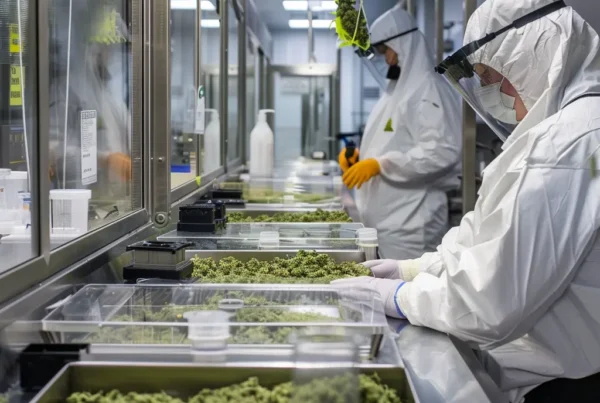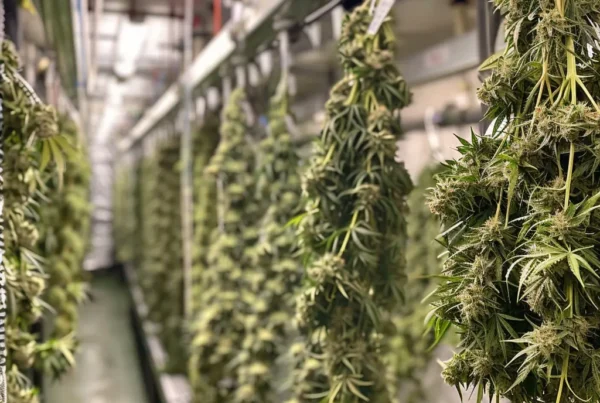Hydrocarbon extraction is a method widely used to pull out valuable compounds from plants, especially in the cannabis industry. This technique uses solvents like butane and propane to dissolve cannabinoids and terpenes, which are key components for various cannabis products. Known for its efficiency and ability to preserve the natural flavors and aromas of the plant, hydrocarbon extraction has become a go-to method for producing high-quality extracts.
Key Takeaways
- Hydrocarbon extraction uses solvents like butane and propane to extract valuable compounds from plants.
- This method is highly efficient in preserving the natural flavors and aromas of the plant.
- It is commonly used in the cannabis industry to produce various products like oils, wax, and shatter.
- Safety and environmental concerns are important considerations when using hydrocarbon extraction.
- Technological advancements are continually improving the efficiency and safety of hydrocarbon extraction.
Understanding Hydrocarbons
Hydrocarbons are organic compounds made up of hydrogen and carbon atoms. They form from the compression of animal and plant remains over long periods. These compounds are found in porous rocks like sandstone, limestone, and shale, where they pool and concentrate. Understanding the basics of hydrocarbons is essential for grasping their role in various extraction processes.
The Hydrocarbon Extraction Process
Step-by-Step Overview
The hydrocarbon extraction process is a method that uses hydrocarbon solvents to pull out cannabinoids and terpenes from plant material. This method is known for its efficiency and high-quality results. Here are the general steps involved:
- Acquire High-Quality Plant Material: The quality of the extract depends largely on the quality of the plant material. It’s essential to store it in a place without light or changing temperatures to prevent degradation.
- Washing the Plant Material: This step involves cleaning the plant material to remove any impurities.
- Combining with Solvent: Hydrocarbons like propane and butane are used as solvents. They mix with the plant material to strip out the desired compounds.
- Separation and Collection: The mixture is then separated, and the desired compounds are collected.
- Refinement: The collected compounds are further refined to remove any remaining impurities.
The process is incredibly efficient and results in a high-quality end product.
Equipment Used
Properly maintained professional hydrocarbon extraction equipment has almost no risk. However, since flammable solvents like butane are used, the entire processing lab must comply with safety regulations. Some of the essential equipment includes:
- Extraction vessels
- Solvent tanks
- Recovery pumps
- Vacuum ovens
- Filtration systems
Common Solvents
The most commonly used hydrocarbons in this extraction process are:
- Butane: Known for its efficiency in extracting cannabinoids and terpenes.
- Propane: Often used in combination with butane for better results.
These solvents are chosen for their ability to effectively strip desired chemical compounds from the plant material, resulting in highly concentrated extracts like oils, shatter, and wax.
Applications in the Cannabis Industry
Cannabinoid Extraction
Hydrocarbon extraction is a popular method for extracting cannabinoids from the cannabis plant. This process is favored because it efficiently isolates valuable compounds like THC and CBD. The resulting extracts are used in a variety of products, including oils, edibles, and topicals.
Terpene Preservation
One of the key benefits of hydrocarbon extraction is its ability to preserve terpenes. Terpenes are responsible for the aroma and flavor of cannabis. By maintaining these compounds, the extraction process ensures that the final product retains the plant’s natural characteristics, enhancing the user experience.
Product Types
Hydrocarbon extraction is versatile and can produce a wide range of cannabis products. These include:
- Edibles: Infused with cannabis extracts, edibles offer a discreet and convenient way to consume cannabis.
- Cartridges: Used in vape pens, these provide a portable and easy-to-use option for cannabis consumption.
- Topicals: Applied directly to the skin, these products are used for localized relief of pain and inflammation.
The demand for extracted cannabis products is quickly gaining traction, with edibles companies seeing $1.5 billion in sales in major markets in 2017.
Hydrocarbon extraction is a cornerstone of the cannabis industry, enabling the production of high-quality, diverse products that meet consumer needs.
Advantages of Hydrocarbon Extraction
Efficiency and Yield
Hydrocarbon extraction is known for its high efficiency. This method can produce large amounts of material quickly because hydrocarbons have a low boiling point and can easily recondense. This makes the process not only fast but also capable of yielding more stable extracts.
Cost-Effectiveness
One of the main benefits of using hydrocarbons like butane or propane is their cost-effectiveness. These solvents are relatively inexpensive and can be reused, reducing overall costs. Additionally, the process requires less energy compared to other methods, making it more economical.
Product Quality
Hydrocarbon extraction is favored for its ability to produce high-quality products. The process does not require high temperatures or pressures, which helps in preserving the delicate compounds in the material. This results in a final product that is rich in cannabinoids and terpenes, offering a superior experience for consumers.
Hydrocarbon extraction allows for the creation of a wide range of products from a single extraction, without the need for further refinement.
In summary, hydrocarbon extraction stands out for its efficiency, cost-effectiveness, and ability to produce high-quality products, making it a preferred choice in various industries.
Safety and Environmental Concerns
Handling and Storage
Hydrocarbon extraction involves using highly flammable solvents, which pose significant safety risks. Flammability is a major concern, as improper handling can lead to fires or explosions. To minimize these dangers, always perform hydrocarbon extraction in a closed-loop system and ensure your laboratory setup complies with OSHA and NFPA safety standards. Additionally, it’s crucial to use high-quality solvents to avoid unknown contaminants that could compromise the final product.
Environmental Impact
The environmental effects of hydrocarbon extraction are also noteworthy. This process can produce hazardous products if not conducted properly. For instance, low-quality solvents might leave behind toxic residues, which are dangerous to inhale. Moreover, the extraction process itself can contribute to environmental pollution if not managed correctly. Implementing sustainable practices, such as reducing carbon footprint and conserving water, can help mitigate these impacts.
Regulations and Compliance
Compliance with regulations is essential for safe hydrocarbon extraction. Laboratories must adhere to OSHA and NFPA regulations, especially when using flammable solvents like butane. This includes having a Class 1, Division 1 (C1D1) extraction space with gas monitoring, zero ignition points, adequate ventilation, and a fire-suppression system. Regularly checking certifications of your equipment can also ensure safety and compliance.
Proper handling and thorough purging of solvents are crucial to ensure product safety and purity. Neglecting these steps can result in residual solvents that affect the quality and safety of the final product.
Comparing Hydrocarbon Extraction to Other Methods
CO2 Extraction
CO2 extraction uses carbon dioxide under high pressure and low temperature to extract cannabinoids and terpenes. This method is known for producing clean and pure extracts without any residual solvents. However, it requires expensive equipment and is generally slower than hydrocarbon extraction.
Ethanol Extraction
Ethanol extraction involves soaking the plant material in ethanol to pull out the desired compounds. It’s a straightforward and cost-effective method but can sometimes extract unwanted substances like chlorophyll, which can affect the taste and color of the final product. Hydrocarbon extraction, on the other hand, is highly efficient in preserving the terpene profile, which is crucial for maintaining the flavor and aroma of the final product.
Solventless Methods
Solventless methods like ice water, dry sifting, and rosin pressing do not use any solvents. These methods are considered safer and more natural but often yield lower amounts of extract. They are also more labor-intensive and may not capture the full range of cannabinoids and terpenes.
For a practical guide for marijuana farmers on cannabis trichomes extraction methods like ice water, dry sifting, and rosin pressing, troubleshooting tips and future research discussed.
Here’s a quick comparison:
| Method | Pros | Cons |
|---|---|---|
| Hydrocarbon | High efficiency, terpene preservation | Requires careful handling and storage |
| CO2 | Clean, pure extracts | Expensive, slower |
| Ethanol | Cost-effective, simple | May extract unwanted substances |
| Solventless | Safe, natural | Lower yield, labor-intensive |
Each method has its own set of advantages and drawbacks, making it essential to choose the right one based on your specific needs and resources.
Future Trends in Hydrocarbon Extraction
Technological Innovations
The future of hydrocarbon extraction is bright with technological innovations. Automated systems are expected to become more reliable and affordable. These systems will feature advanced safety measures and internal monitoring, making the process safer and more efficient.
Market Growth
The demand for cannabis products is driving rapid advancements in extraction technologies. As legalization spreads, the market for hydrocarbon extraction is set to grow. This growth will likely lead to more investment in research and development, resulting in even better extraction methods.
Regulatory Changes
Regulations around hydrocarbon extraction are evolving. Some regions have banned or are considering bans on hydrocarbon solvents due to safety concerns. However, as technology improves, these regulations may become more favorable, allowing for safer and more efficient extraction processes.
Exploring the future of cannabinoid synthesis, biotechnological advances, and potential medical breakthroughs in cannabis research.
Conclusion
In summary, hydrocarbon extraction is a powerful method for isolating valuable compounds from plant material, especially in the cannabis industry. By using solvents like butane and propane, this technique effectively preserves the flavor and aroma of the final product. It stands out for its efficiency and ability to capture a wide range of phytochemicals. Whether you’re looking to produce oils, waxes, or other concentrates, hydrocarbon extraction offers a reliable and effective solution. As with any method, it’s important to understand the process and its benefits to make the best choice for your needs.
Frequently Asked Questions
What is hydrocarbon extraction?
Hydrocarbon extraction is a process that uses solvents like butane or propane to dissolve and extract compounds from plants, especially cannabis. These compounds can include cannabinoids and terpenes.
Why is hydrocarbon extraction popular in the cannabis industry?
This method is popular because it efficiently preserves the terpene profile, which is important for the flavor and aroma of the final product. It also captures almost the entire phytochemical profile of the plant.
What are the main solvents used in hydrocarbon extraction?
The primary solvents used are butane and propane. These solvents are effective in extracting desirable compounds from the plant material.
What types of products can be made using hydrocarbon extraction?
Hydrocarbon extraction can produce a variety of products like cannabis oils, shatter, wax, and hash. These products are highly concentrated and contain little to no solvent residue.
Is hydrocarbon extraction safe?
While effective, hydrocarbon extraction must be performed with care. Proper handling and storage of solvents are crucial to ensure safety. Following regulations and guidelines is also important.
What are the benefits of hydrocarbon extraction?
This method offers high efficiency, cost-effectiveness, and superior product quality. It is also known for producing stable products with a rich profile of cannabinoids and terpenes.






